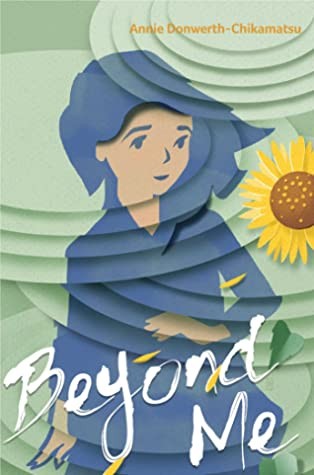Beyond Me by Annie Donwerth-Chikamatsu, published in 2015, is a powerful exploration of grief, identity, and finding your own path in the face of overwhelming loss. This young adult novel, while categorized as fiction, resonates with a raw authenticity that feels intensely personal. Donwerth-Chikamatsu, a writer known for her ability to capture the complexities of teenage emotions, crafts a narrative that’s both heartbreaking and hopeful. The book’s release coincided with a surge of interest in stories that honestly depict the struggles of adolescence, and it continues to hold relevance today for its unflinching portrayal of navigating grief.
The story centers around Miki, a teenager whose world is shattered when her older sister, Hana, dies suddenly. Click here to purchase. The narrative isn’t just about the initial shock; it’s about the messy, painful process of picking up the pieces and figuring out who you are without the person who defined so much of your life. We witness Miki grappling with guilt, anger, and a profound sense of loneliness. The book doesn’t offer easy answers, and that’s what makes it so compelling. Donwerth-Chikamatsu doesn’t shy away from portraying the awkwardness of grief, the moments of feeling lost, and the sometimes-selfish ways we react when in pain.
The setting is suburban America, familiar and yet, tinged with the grayness of Miki’s emotional state. The locations – the family home, school, and the places where Hana’s memory lingers – feel almost claustrophobic at times, mirroring the way Miki feels trapped by her loss. The author uses vivid sensory details to create an atmosphere that’s both melancholic and real. You can feel the chill in the air when Miki steps into Hana’s room or see the faded colors of the photos that now serve as painful reminders. The pacing is deliberate, mirroring Miki’s slow journey through grief, with moments of intense emotion punctuated by quiet introspection.
Miki’s character development is the heart of the novel. She’s not a perfect protagonist; she’s flawed, often making choices that seem misguided or even cruel, particularly towards her family, which feels very honest. We see her struggle with the weight of being the “surviving” sibling, the pressure to live up to Hana’s memory, and her own need to forge an identity independent of her sister’s shadow. Her relationships, particularly with her parents and her best friend, are tested as she navigates this new reality. The book excels at portraying the complexities of family dynamics in the face of grief, showing how each member processes loss differently. Donwerth-Chikamatsu does a remarkable job of crafting a character that feels both unique and relatable.
Beyond Me explores several central themes, but grief, identity, and resilience stand out. The novel delves into how loss can force us to confront our own vulnerabilities and reshape our understanding of ourselves and our place in the world. It also touches on the pressures placed on young women to be perfect or to live up to certain expectations. Find your copy today! One aspect that resonated with me personally was the depiction of how grief can sometimes feel like an isolating experience, even when you’re surrounded by people who love you. I remember feeling a similar disconnect after a family loss, the sense that no one could truly understand the unique way I was experiencing pain, and the book captured that feeling with striking accuracy.
Donwerth-Chikamatsu’s writing style is clear, direct, and emotionally charged. She avoids unnecessary flourishes, opting for a narrative that feels authentic and intimate. The dialogue rings true, capturing the way teenagers actually speak, with their slang and unspoken emotions. The author’s voice is consistent throughout the novel, creating a sense of continuity and depth. She uses internal monologue to great effect, allowing us access to Miki’s innermost thoughts and feelings, further strengthening the emotional connection with the character. The pacing, as mentioned before, mirrors the ebb and flow of grief, with moments of intense pain followed by periods of quiet reflection.
The novel doesn’t shy away from difficult moments. It doesn’t wrap everything up in a neat bow or offer easy solutions. Instead, it allows readers to sit with the messiness of grief and to acknowledge that healing is not linear. Miki’s journey is not one of sudden transformation but of slow, painful growth. She learns to accept her imperfections, to find her own path, and to honor her sister’s memory in a way that is true to herself. The ending is not necessarily happy, but it is hopeful, suggesting that even in the face of profound loss, it is possible to find a way to move forward.
Beyond Me is more than just a young adult novel about grief; it’s a powerful reminder of the resilience of the human spirit. It explores the complexities of family, friendship, and identity with honesty and vulnerability. Click to buy now. The book’s impact is not fleeting; it stays with you, prompting reflection on your own experiences with loss and the importance of empathy. It’s a book that understands the nuances of grief, and it handles the topic with a rare level of sensitivity. It offers no easy answers, but it provides a sense of comfort in the acknowledgment that you are not alone in your struggle.
I highly recommend Beyond Me to anyone who has experienced loss or anyone looking for a story that portrays the complexities of adolescence with honesty and depth. It’s particularly well-suited for young adults, but its themes of grief and identity resonate with readers of all ages. It’s a book that encourages empathy, self-reflection, and the acceptance of our own imperfections. If you enjoyed novels like The Fault in Our Stars by John Green or I’ll Give You the Sun by Jandy Nelson, you’ll likely find Beyond Me to be a similarly compelling and emotionally resonant read. It’s a book that leaves a lasting impression, prompting reflection on the power of resilience and the importance of finding your own way in the face of adversity. Purchase your copy here.

